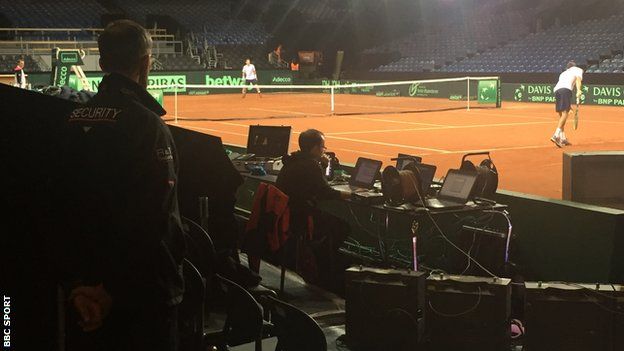Davis Cup final: Paris attacks force heightened security
- Published

There was a security presence courtside at Flanders Expo during practice for the Davis Cup final
Davis Cup final: Belgium v Great Britain |
|---|
Venue: Flanders Expo, Ghent Dates: 27-29 November |
BBC coverage: Watch on BBC television, the BBC Sport website, Connected TVs, tablets, mobiles and app and listen on Radio 5 live and 5 live sports extra. Full details. |
There has only been one time when I've been forced to remain indoors in the evening whilst covering a sporting event.
Only one occasion when the hotel door was physically barred from the inside and the management told us to stay put.
That was not in some far flung corner of the world. It was in Birmingham.
The summer of 2011, when a Test match was played at Edgbaston in the context of urban unrest, with the riots across England. We did what we were told, but it felt wrong.
So far in Ghent, host to Britain's first Davis Cup final for 35 years and a city of stunning architectural settings, nothing has felt threatening.
'Armed security around the boundary'
In sport security often becomes the story. The 'to go or not to go' dilemma is shared by competitors, journalists and spectators.
Occasionally there are direct instructions, but more often than not the decision is ultimately left to the individual. We all have to answer the fundamental question, 'is it safe?' That isn't easy.
In my experience there are two differing approaches to security at events considered to be a risk; the deliberate display of strength and the discreet deployment.
The most memorable example of the first strategy I've experienced was in India in December 2008, external when the England cricket team returned to the country after the Mumbai attacks.
Even at the first training session in Chennai there were armed security men around the boundary. Every time a batsman walked from the ground back into the changing room there were soldiers or police around him. Always with guns.
The cricket ground in Mohali is traditionally favoured when there is a heightened need for security in India - the modern grid pattern of the wide surrounding streets makes it easier to close off.
That is where England played India in the second Test in 2008 and is also where India played Pakistan in the 2011 World Cup.
On both occasions the display of weaponry and manpower was extraordinary. I can remember a raised, sand-bagged machine gun point close to the ground and so many different uniforms it was hard to distinguish which regiment or department each group of security personnel belonged to.
'No panic, no aggression at Flanders Expo'
Preparations for the Davis Cup final between Belgium and Great Britain in Ghent
A sense of safety is not always created by sheer numbers. In Ghent, so far, we've experienced the other approach.
The International Tennis Federation made it clear very early on that spectators would face additional security checks. In essence, fans won't be able to bring anything into the venue - we are told there will be lockers provided for bags.
There is certainly a big area designated for refreshment (to buy) before you reach the courts, turn left for 'Belgian cafe' or right for 'British pub'. The facilities are all being constructed around us.
The multi-purpose hall is essentially a blank canvas for whatever event comes next and dozens of contractors are hammering, attaching, fixing and adjusting. There is no sense of tension nor restriction.
Naturally, bags are searched as the media come in, but it's all done quickly and with a sense of courtesy. There is no panic, no aggression.
Take a step back when the players move around between practice and media sessions and you can spot the men who are there to watch out for anything unusual.
But if anyone is carrying a gun then they are doing it discretely.
'Patience of the public is critical'
One of the most impressive bits of sporting security I've experienced came at the Ryder Cup, at the K Club in Ireland in 2006.
Hovering by the 16th green as the victory celebrations began I spotted Bill Clinton watching. I asked him a question, he responded. I tried another, he answered. Just as I began the third question an arm came down between us - "enough". The spectator in the regulation baseball cap and pink polo shirt was the former president's security man and he'd been watching all along.
Whenever there is sport and security the forbearance of the public is critical. Patience during bag searches is now commonplace and most spectators in Ghent will be aware that it is going to happen and are sanguine about the necessity.
It's unlikely there will be many repeats of the behaviour I witnessed from a spectator at the 2012 Paralympics, who fiercely objected to having his watch put through a scanner at the entrance to the equestrian competition.
"I want to speak to your lieutenant!" he shouted at the soldier who was supervising security. Certainly sir, although that will be a little tricky as my lieutenant is currently on a tour of Afghanistan."
Petulance put in place, everything put into context.
For those of us fortunate enough to report on sport for a living we are doing our job by going to events. Maintaining the status quo is perhaps the only meaningful way we can react when horrible things happen in the world.
Let's remember that the Davis Cup has been running since 1900, with the only interruptions coming when Europe was at war with itself.
Sport is a function and symptom of a positive and peaceful world.
- Published25 November 2015
- Published24 November 2015
- Published25 November 2015
- Published8 November 2016
- Published17 June 2019
- Published19 July 2016